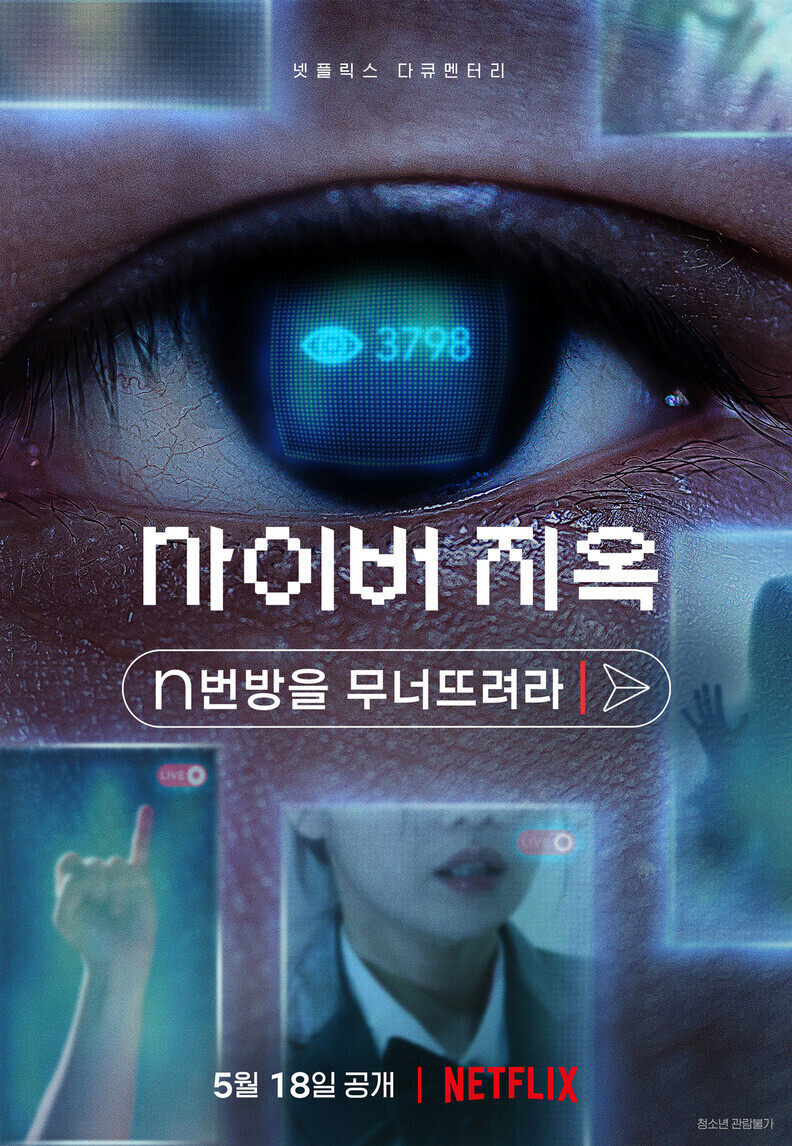hankyoreh
Links to other country sites 다른 나라 사이트 링크
[Editorial] Nth Room case is a warning: More online sex crimes lurk in the shadows

Since its recent release, “Cyber Hell,” a Netflix documentary about the “Nth Room” case of online sexual abuse, has become one of the most popular movies on the streaming platform in South Korea and abroad. While the shockingly brutal nature of the case probably contributed to the attention the film has garnered, it’s clear that the ongoing nature of sex crimes, which continue to take place in dark corners of the cyber world, helped the documentary amass a wide viewership.
Although Korean society opened its eyes to the threat of digital sex crimes and policymakers came up with various measures against them in the aftermath of the Nth Room case, we still must continuously reflect and consider whether we have secured a sufficient safety net and whether we are doing enough to prevent such crimes from taking place.
In a recent interview with the Hankyoreh, former prosecutor Seo Ji-hyun, who previously headed the task force on digital sex crimes at the Ministry of Justice, said, “When I confirmed that digital sex crimes, which had temporarily abated [after the Nth Room case], had become even more rampant after retreating even further into the shadows and evolving, I really felt hopeless.”
Although relevant laws have been strengthened so that simply possessing and viewing materials of sexual abuse can lead to criminal punishment, blind spots still remain. According to the Hankyoreh’s analysis of the initial trial results of 378 “regular accomplices” of the Nth Room, 261 defendants (69.1%) were sentenced to probation while 64 (16.9%) were fined, 47 (12.4%) were sentenced to prison, four (1.1%) received suspended sentences, and two (0.5%) were declared not guilty.
Compared to what was the norm in the past, when those charged with possession or purchase of materials of sexual abuse were typically fined or received suspended sentences, Nth Room offenders definitely received harsher punishments. Still, mitigating circumstances that centered the perpetrators were problematically accepted during many of their trials.
One of the biggest reasons that criminal sexual abuse has yet to be rooted out is the fact that sexually exploitative materials have a solid consumer base. Accordingly, we should do more to address the fact that the level of punishment these consumers may face when caught is not enough to deter them from consuming exploitative material in the first place.
As digital sex crimes become more and more cunning and varied, we must urgently establish legislation that punishes the operation of platforms where sexual abuse materials are distributed.
The government should actively interest itself and act on the matter as well. The issue of digital sex crimes was covered during Saturday’s South Korea-US summit, after which the leaders of the two countries announced through their joint statement that “the US and ROK joined the Global Partnership for Action on Gender-Based Online Harassment and Abuse as founding members.”
Considering this, it’s illogical that the Ministry of Justice, which has jurisdiction over the Act on Special Cases Concerning the Punishment, etc., of Sexual Crimes, removed Seo from the task force on digital sex crimes despite her remaining term, leading Seo and expert advisers of the task force to resign in protest.
The government should show through actions rather than words that it sincerely cares about responding to digital sex crimes to protect the safety and human rights of the people.
Please direct questions or comments to [english@hani.co.kr]

Editorial・opinion
![[Column] Park Geun-hye déjà vu in Yoon Suk-yeol [Column] Park Geun-hye déjà vu in Yoon Suk-yeol](https://flexible.img.hani.co.kr/flexible/normal/500/300/imgdb/original/2024/0424/651713945113788.jpg) [Column] Park Geun-hye déjà vu in Yoon Suk-yeol
[Column] Park Geun-hye déjà vu in Yoon Suk-yeol![[Editorial] New weight of N. Korea’s nuclear threats makes dialogue all the more urgent [Editorial] New weight of N. Korea’s nuclear threats makes dialogue all the more urgent](https://flexible.img.hani.co.kr/flexible/normal/500/300/imgdb/original/2024/0424/7317139454662664.jpg) [Editorial] New weight of N. Korea’s nuclear threats makes dialogue all the more urgent
[Editorial] New weight of N. Korea’s nuclear threats makes dialogue all the more urgent- [Guest essay] The real reason Korea’s new right wants to dub Rhee a founding father
- [Column] ‘Choson’: Is it time we start referring to N. Korea in its own terms?
- [Editorial] Japan’s rewriting of history with Korea has gone too far
- [Column] The president’s questionable capacity for dialogue
- [Column] Are chaebol firms just pizza pies for families to divvy up as they please?
- [Column] Has Korea, too, crossed the Rubicon on China?
- [Correspondent’s column] In Japan’s alliance with US, echoes of its past alliances with UK
- [Editorial] Does Yoon think the Korean public is wrong?
Most viewed articles
- 1‘We must say no’: Seoul defense chief on Korean, USFK involvement in hypothetical Taiwan crisis
- 2N. Korean delegation’s trip to Iran shows how Pyongyang is leveraging ties with Moscow
- 3‘Weddingflation’ breaks the bank for Korean couples-to-be
- 4Korea sees more deaths than births for 52nd consecutive month in February
- 546% of cases of violence against women in Korea perpetrated by intimate partner, study finds
- 6Will NewJeans end up collateral damage in internal feud at K-pop juggernaut Hybe?
- 7[Column] Park Geun-hye déjà vu in Yoon Suk-yeol
- 8[Editorial] New weight of N. Korea’s nuclear threats makes dialogue all the more urgent
- 9Amnesty notes ‘erosion’ of freedom of expression in Korea in annual human rights report
- 10“Parental care contracts” increasingly common in South Korea